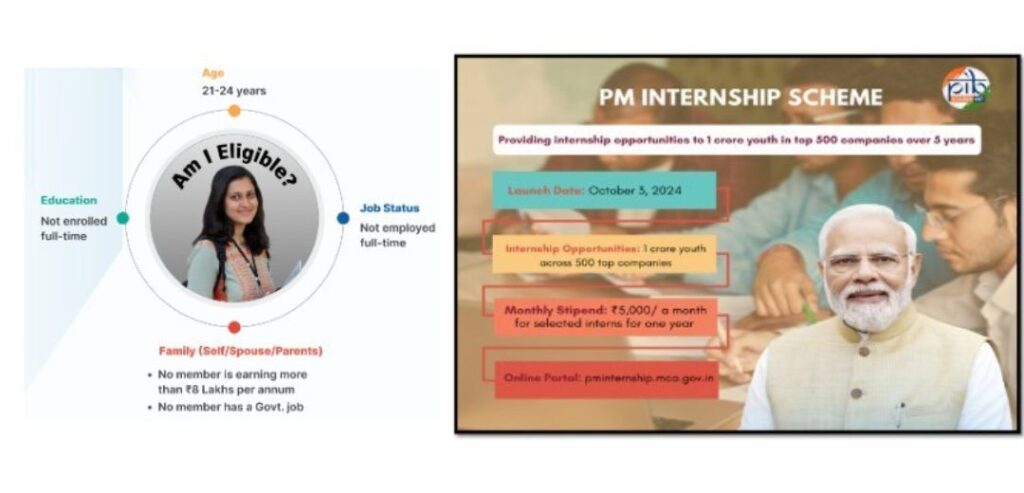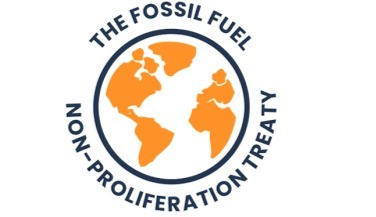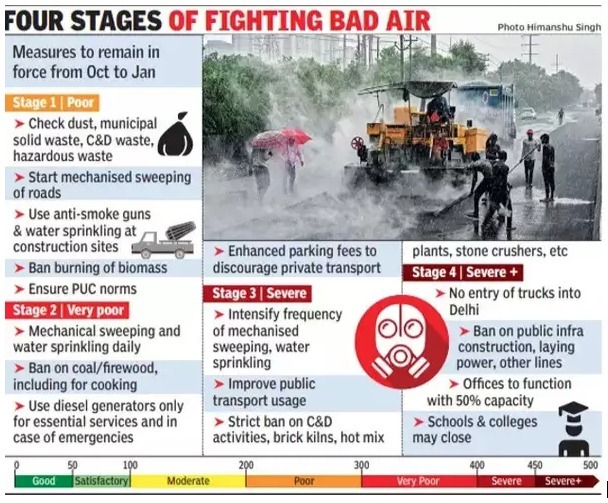PM Internship Scheme (Prelims & Mains- Polity & Governance)
Why in news?
Around 6.5 lakh youth have applied for internships under the PM Internship Scheme in Top Companies (Scheme) pilot project, when the window closed for the 1.27 lakh opportunities initially being offered by Corporate India under the scheme.

About PM Internship Scheme
- The Prime Minister’s Internship Scheme for 2024-25 aims to provide extensive internship opportunities to one crore youth over the next five years in India’s top 500 companies.
- Announced in the Budget 2024-25, this initiative offers 12-month internships to help young people gain hands-on experience in real-life business environments, bridging the gap between academic learning and industry needs.
- A Pilot Project launched on 3rd October,2024 aims to 1.25 lakh internships for the Financial Year 2024-25, with top companies identified based on their CSR expenditure. The scheme operates independently from existing skill development programs and emphasises enhancing employability through practical experience.
Eligibility
The Prime Minister’s Internship Scheme offers a 12-month internship aimed at providing young individuals with real-world job experience. The key eligibility criteria include:
- Age: Applicants must be between 21 and 24 years old, Indian nationals, not employed full-time, and not engaged in full-time education. Those enrolled in online or distance learning programs are eligible to apply.
- Educational Qualifications: Candidates must have completed High School, Higher Secondary School, hold certificates from ITI, diplomas from Polytechnic Institutes, or hold undergraduate degrees such as BA, B.Sc., B.Com, BCA, BBA, or B.Pharma etc.
The Prime Minister’s Internship Scheme offers comprehensive support and benefits under a Direct Benefit Transfer (DBT) model. Key highlights include:
1. Monthly Assistance: Interns receive ₹5,000 per month for 12 months. Of this, ₹500 is contributed by the company through its CSR funds, and ₹4,500 is transferred by the government to the intern’s Aadhaar-linked bank account.
2. Grant for Incidentals: A one-time grant for incidentals of 6,000 will be disbursed to each intern by the government through Direct Benefit Transfer, upon the intern’s joining at the internship location.
3. Training Costs: Expenditures associated with the training of interns under the Scheme, would be borne by the company from its CSR funds, as per the extant rules.
4. Insurance Coverage: Insurance coverage shall be provided to each individual intern under insurance schemes of the Government of India, Pradhan Mantri Jeevan Jyoti Bima Yojana and Pradhan Mantri Suraksha Bima Yojana, for which premium amount shall be provided by Government. In addition, the company may also provide additional accidental insurance coverage to the interns.
Fossil Fuel Non-Proliferation Treaty (FF-NPT) (Prelims & Mains- Science & Technology)
Why in news?
A group of governments and civil society organisations believe so and are pushing the idea of a fossil fuel non-proliferation treaty (FF-NPT).

What is Non-Proliferation treaty?
The NPT is a landmark international treaty whose objective is to prevent the spread of nuclear weapons and weapons technology, to promote cooperation in the peaceful uses of nuclear energy and to further the goal of achieving nuclear disarmament and general and complete disarmament. The Treaty represents the only binding commitment in a multilateral treaty to the goal of disarmament by the nuclear-weapon States.
A total of 191 States have joined the Treaty, including the five nuclear-weapon States. More countries have ratified the NPT than any other arms limitation and disarmament agreement, a testament to the Treaty’s significance.[India is one of only five countries that has either not signed the NPT or has signed but withdrawn. The other four countries are Pakistan, Israel, North Korea, and South Sudan.]
It was designed to prevent the spread of nuclear weapons, to further the goals of nuclear disarmament and general and complete disarmament, and to promote cooperation in the peaceful uses of nuclear energy.
The Treaty establishes a safeguards system under the responsibility of the International Atomic Energy Agency (IAEA). Safeguards are used to verify compliance with the Treaty through inspections conducted by the IAEA.
The Treaty promotes cooperation in the field of peaceful nuclear technology and equal access to this technology for all States parties, while safeguards prevent the diversion of fissile material for weapons use.
About FF-NPT (fossil fuel non-proliferation treaty):
- Fossil fuels have finally been dragged centre stage. Despite this, many governments are still approving new coal, oil and gas projects — threatening our chances of limiting warming to 1.5ºC.
- We now need a concrete, binding plan to end the expansion of new coal, oil and gas projects and manage a global transition away from fossil fuels.
- To protect people from the threat fossil fuels pose to our climate, our health and our future, a growing bloc of 14 countries are seeking a negotiating mandate for a Fossil Fuel Treaty.
- The proposed treaty would complement the Paris Agreement by providing the global roadmap needed to halt the expansion of fossil fuel, manage an equitable phase-out of coal, oil and gas, and lay the foundations for a true, just energy transition in which no worker, community or country is left behind.
Operates on three pillars:
- Non-proliferation which is a global cooperation model to end the expansion of coal, oil and gas production.
- A fair phase-out is comprised of an equitable plan to shut down existing fossil fuel production in a way that nations with the capacity and historical responsibility for emissions transition faster and empower others.
- ‘Just transition’ calls for fast-tracking the adoption of renewable energy and economic diversification away from fossil fuels so that no worker, community or country is left behind.
At COP29 in Baku, it was announced that 10 more countries had joined discussions on the FF-NPT this year, though their names were kept private.
FF-NPT has been endorsed by 13 Small Island Developing States of the Pacific, such as Vanuatu, Tuvalu, Tonga, Fiji, and the Solomon Islands, who were least responsible for global warming but are most vulnerable to its impact. Colombia, one of the largest coal producers and exporters globally, endorsed FF-NPT in December 2023 at COP28.
Where is India placed?
The initial focus has been on smaller countries in Asia, Africa, and Latin America.
Moving forward, the aim is to bring large, fossil fuel-dependent countries like India and Indonesia on board. From a justice and equity perspective, India stands to benefit from the Treaty and should consider joining.
Graded Response Action Plan (GRAP) IV (Prelim & Mains- Environment)
Why in news?
The highest stage of pollution-related restrictions i.e., Graded Response Action Plan IV (GRAP IV) has been announced now for Delhi-NCR.

About GRAP IV:
GRAP is a set of emergency measures that kick in to prevent further deterioration of air quality once it reaches a certain threshold in the Delhi-NCR region. Approved by the Supreme Court in 2016 and notified in 2017, the plan was formulated after several meetings the Environment Pollution (Prevention and Control) Authority (EPCA) held with state government representatives and experts.
GRAP is incremental in nature and thus, when the air quality dips from ‘poor’ to ‘very poor,’ measures listed under both sections must be followed. Stage I of GRAP is activated when the AQI is in the ‘poor’ category (201 to 300), Stage II is when it’s in the ‘very poor’ category (301-400), Stage III is when the AQI is the ‘Severe’ category (401-450) and finally Stage IV is when it rises to the ‘Severe +’ category (more than 450).
Why has GRAP IV been imposed now?
The decision was based on a review of the air quality scenario and forecasts for meteorological conditions. The air quality is expected to remain in this adverse range owing to heavy fog, variable winds, and highly unfavourable meteorological and climatic conditions.
What is allowed under GRAP IV?
GRAP IV says:
1. Stop entry of truck traffic into Delhi (except for trucks carrying essential commodities/ providing essential services). All LNG/CNG/Electric/BS- VI Diesel trucks shall, however, be permitted to enter Delhi.
2. Do not permit Light Commercial Vehicles (LCVs) registered outside Delhi, other than EVs/CNG/BS- VI diesel, to enter Delhi, except those carrying essential commodities/providing essential services.
3. Enforce a strict ban on plying of Delhi registered BS-IV and below diesel-operated Medium Goods Vehicles (MGVs) and Heavy Goods Vehicles (HGVs) in Delhi, except those carrying essential commodities/providing essential services.
4. Ban construction and demolition activities, as in the GRAP Stage-III, also for linear public projects such as highways, roads, flyovers, overbridges, power transmission, pipelines, telecommunications, etc.
5. NCR state governments and the Delhi government may decide to discontinue physical classes, even for classes VI-IX and XI, and conduct lessons online.
6. NCR state governments/Delhi government should decide to allow public, municipal, and private offices to work on 50% strength and the rest to work from home.
7. The Central Government may make appropriate decisions on permitting work from home for employees in central government offices.8. State Governments may consider additional emergency measures like the closure of colleges/ educational institutions and closure of non-emergency commercial activities, permitting the running of vehicles on the odd-even basis of registration numbers, etc.


